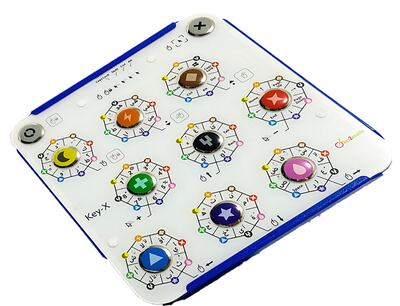Key2Enable, a start-up providing assistive technologies in education to people of determination, is seeking investors to expand in the Middle East via its regional base in Abu Dhabi.
The EdTech company, which started in Brazil, is looking to raise up to $1.5 million to finance its regional growth and aims to close a deal by mid-2021, Jose Rubinger, co-founder of Key2Enable, says.
"We will go for the whole Mideast, hire people and conduct many pilots in schools and rehabilitation centres," Mr Rubinger says. "We can build an empire here because schools in these countries must accept students with disability and we want to provide them with a set of our assistive tools."
Assistive technology in education is any hardware, software or system of processes that helps students with a disability to engage more effectively with the curriculum and their learning environment.
Over one billion people – about 15 per cent of the global population – live with some form of disability and this number is increasing, according to the World Health Organisation.
Key2Enable, which started operations in Brazil in 2015 before opening a base in the US in 2018, set out to create a more inclusive educational experience for students with a range of physical and intellectual disabilities.
The company developed Key-X, a nine-button multi-functional smart keyboard that helps people of determination to use computers, tablets and smartphones for learning, communicating and gaming as part of its complete education platform.
The idea is to give children and adults with various disabilities – ranging from cerebral palsy, severe autism, Down syndrome, multiple sclerosis, Alzheimer’s and Parkinson’s – greater autonomy and an inclusive learning experience through eye blinks and slight body gestures.
The company targets schools, rehabilitation centres and the households of people with determination to provide the students, teachers and caregivers the digital tools for accessible education.
In Brazil, where it makes more than 90 per cent of its sales, Key2Enable's products are in 500 schools and used by more than 8,000 people, Mr Rubinger says.
With ambitions to expand beyond its home market, the Key2Enable team came to the UAE capital in 2018 when Krypto Labs, an Abu Dhabi innovation hub, presented the company with an Entrepreneur Hero award at the EdTech Innovation Start-up competition. In 2019, it won the education category in the Special Olympics Challenge in Abu Dhabi, which sought innovative solutions that could improve the quality of life for people of determination. It was also one of 10 teams to be accepted into the first cycle of the Ma'an Social Incubator programme, which was established by the Department of Community Development in the capital.
The company set up a base in Abu Dhabi's technology start-up space Hub71, attracted by access to the massive Middle East market of more than 400 million potential users and by the UAE's national policy to empower people of determination.
It developed an educational programme and keyboard in Arabic and started to approach institutions in Abu Dhabi, Dubai, Sharjah and Ajman to demonstrate its technologies with workshops and pilot programmes.
However, the Covid-19 outbreak in early 2020 posed an added challenge to students with disabilities and complicated the company's plans as schools switched to online learning.
The WHO says people with disabilities have been disproportionately affected during the pandemic and called for appropriate action by schools and other educational facilities to ensure continued education for students with disabilities who may be required to study from home for longer periods.
In response to the pandemic, Key2Enable built an online platform that children can use with the help of their parents and caregivers at home.
"We saw this as opportunity to build a different platform because there's a big need in the market to support people with disabilities who are staying at home and parents don’t know how to cope," Mr Rubinger says.

Now, the company aims to resume its pilot programmes in February as it continues discussions with schools such as Al Noor and Aldar Academies and government bodies including the Ministry of Community Development and the Zayed Higher Organisation for People of Determination.
Mr Rubinger, an electronic engineer, says he is driven by using his knowledge of technology to improve the lives of people with disabilities.
"If I can change the life of one person in a school, then others will follow. It's impossible to see this change and not want it for your child," he says.
Founders of the company, which is in the seed stage of funding, have invested $1.5m in the business since 2013 when they started to build the first prototypes. They attracted investors such as the US-based Singularity University with $100,000 and Krypto Labs with $220,000, he says.
Now, it is in talks with investors such as Global Ventures, a venture capital firm that backs growth-stage and tech-focused businesses in emerging markets, he says.
Key2Enable aims to close a financing deal with an investor by June, after finalising projects in Europe and starting pilot programmes in the UAE.
"We have 8,000 users in Brazil and if we bring the expertise we got in Brazil to the region, we can double the number of users in two years," he says.
The start-up is hiring 10 people to build a team focused on the Middle East and most of them will begin in February, he says.
"We can be the Uber of assistive devices," Mr Rubinger says.
Company Profile:
Name/date started: Key2enable Assistive Technology, 2015 in Brazil and 2018 in the US
Co-Founders: Jose Rubinger Filho, Adriano Assis, William de Oliveira, Alexandre Assis and Marcelo Rubinger.
Based: Brazil with operations in the UK, UAE, Chile and the US
Sector: Education and health technology
Size: 12 employees
Stage of investment: Seed
Investors: Krypto Labs and Silicon Valley venture capital firm B37
Q&A with Jose Rubinger, co-founder of Key2Enable:
How has the Covid-19 pandemic impacted your operations?
In March 2020 we were about to start many pilots in the UAE. However, Covid-19 happened and we could not go ahead as planned. In the beginning, we thought that it would be very difficult without being able to visit schools. However, we built an online platform, which can be used by the children with the help of their parents and caregivers inside their homes and in remote settings. If they need any assistive technology devices, they can be sent to their homes.
How is the Middle East market different to Brazil?
In Brazil we only have Portuguese as our official language, therefore we only used one keyboard. When we expanded to the UAE, we had to adapt our keyboard and our educational platform linguistically and culturally. We now have our solution in Modern Standard Arabic and English.
What new skills have you learnt in the process of launching and expanding your start-up?
One of the remarkable ones is that for the first time in my life, I moved to another country and learnt how to work in a multicultural environment and to work around different timezones, dealing with my family in another country, adapting and learning everyday.
What is the next big dream you are looking to make happen?
We wish to be as successful in this region as we are in Brazil. The Middle East has roughly twice the size as Brazil, therefore the market is huge and there are many children whose lives we can change . Another big dream is to co-operate with one of the big tech companies, paving the way to more equal employment opportunities.
Where do you see yourself and Key2Enable after five years?
We are now trying to build our reputation and receive certifications and referrals in the educational market. In five years, we hope to be recognised as one of the main solutions that are suggested by governments in different countries.
If you could start all over again, what would you do differently?
I would have designed the first prototype to be multilingual as this would have helped us to expand faster and adapt quicker. Also, I would have tried to understand more about the start-up ecosystem, because it took us a long time to understand how to access funding.
What already successful start-up do you wish you had started?
WhatsApp, because it conquered the whole of Brazil in a very short time and made people realise the power of start-ups. Also, I would have added many assistive technology communication features to make WhatsApp more inclusive.








